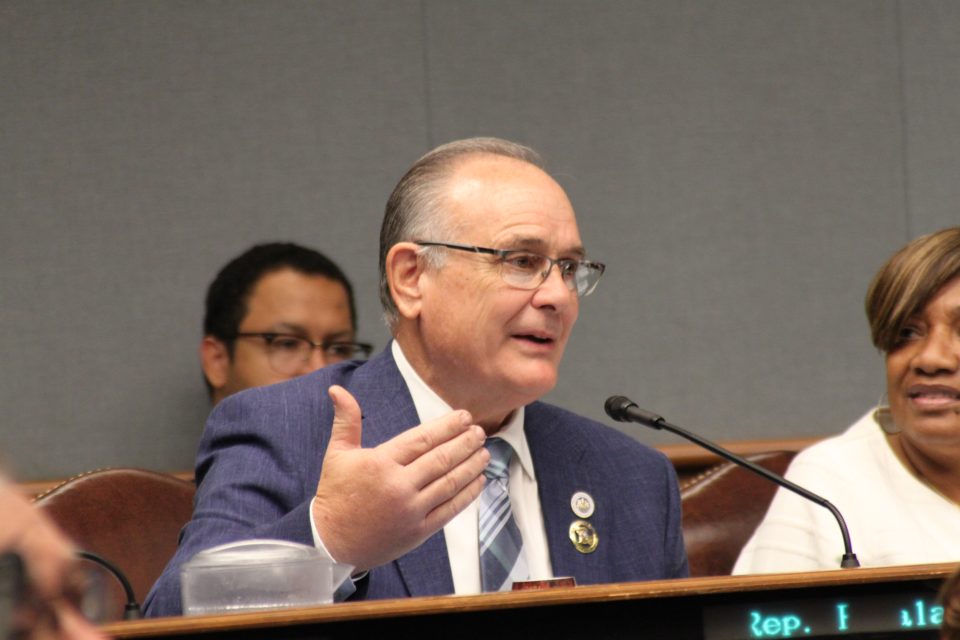
Wacky Art! Say hello to this Cow!
September 25, 2014
Head Bangs: Vandy grad shines in junior season at Belmont Abbey
September 25, 2014For many lawyers and other professionals, a business day’s end or a day off can signal time for cocktails and dinner, or perhaps a game of golf.
For Edmund McCollam, it meant an opportunity to spend some time with the land, perhaps on a tractor, at the working farm on which he and his family have coaxed sweetness from the earth, growing and harvesting sugar for generations.
Friends and relatives say he cut a powerful presence, not because of fancy clothes or flashy possessions, but due to the integrity and inner pride that quietly defined him.
When Edmund took his last breath on Sept. 5 at the age of 78, he was surrounded by loved ones, at his Ellendale Plantation home near La. Highway 311.
The sense of loss extends from family to friends and former clients, who found in Edmund a man they could trust, whose decisions were sound and measured.
“I fear I will not be making many astute decisions without his advice,” said Houma surveyor Clifford Smith, who hunted and fished on Ellendale land with McCollam when they were lads, and who benefitted from the attorney’s legal guidance as an adult.
The country club and subdivision that bear the farm’s name were mid-wived by McCollum, who had a clear understanding, friends and relatives said, of the stewardship role good landowners must play.
“He loved the land and he loved the agricultural aspects of the land,” Smith said, a conclusion shared in conversation by Slattery McCollum, one of four children born to the barrister and his wife, the former Anne Carmouche, whom he married 48 years ago.
For Slattery, Edmund was a teacher and mentor as well as a father. Love of the land and what it produces led Slattery to choose a farming career, tending to the family’s 1,500 acres of sugar cane.
“He had lived life to the very fullest in his own way,” said Slattery, who like other family members is torn between the desire to celebrate the legacy of a life well-lived and coping with the reality of its loss.
Slattery said he also is keenly aware of his father’s strong ethical basis for living, one that he carried with him into the practice of law, primarily on behalf of landowners negotiating leases with oil companies and other mineral firms.
Such was his father’s dedication that while battling cancer, an on-and-off struggle spanning nearly eight years total, he made it to the office to take care of business to within a week of his death.
Although in the last few years he eased up on dress for work – opting to go tieless – Edmund was to the end partial to gray and black suits.
Time off was another matter.
“He wore old holey shirts and shorts to the camp on Grand Isle or just being out in the field,” Slattery recalled. “Our mother tried to get rid of them but he wouldn’t let her.”
Rhoda Portier, Edmund’s legal assistant for a decade, was impressed by his attention to detail and great patience.
“There were never any surprises,” she said. “He did everything by the book, and he didn’t put everything off to the last minute like a lot of lawyers do. There was no panic, he was methodical and thorough and he was very good to me.”
During his career Edmund made time to give back, working on the Louisiana Bar Association’s Committee on Professional Responsibility.
Edmund made a strong impression on members of the local bar, including Assistant District Attorney Jason Lyons, who worked for Edmund early in his career.
“He was one of the best men I ever knew, and one of the finest lawyers I ever knew,” Lyons said.
Time off was often spent at his Grand Isle camp. Ever humble, never flashy, he was content to play in the bays of Grand Isle in a small, nameless boat, eschewing the status symbols so sought by other men, and which he could easily afford, but personally saw as a waste.
When on the water he went about the task of catching fish, at which he excelled. But Edmund never ate them. He disliked the taste of fish, and would share his catches with friends or family members who were more favorably inclined to the flavor, relatives said.
He earned his undergraduate degree at Louisiana State University, and attained his Juris Doctor at its law school in 1964.
Edmund’s earliest days of practice were with the Milling law firm in New Orleans. He then returned to his familial roots, practicing with a partner, Phillip McMahon, while also managing the family plantation. It was with his brothers, John and William, and a cousin, Andrew, that he worked on developing the Ellendale subdivision and the country club that also bears his family farm’s name.
Despite his unequalled patience when it came to dealing with intricacies of the law, Edmund could not make the leap to employing that attribute when it came to football.
“He would get worked up, very annoyed,” Slattery said, explaiing how his father would start out watching a Saints or LSU game on television but had to turn away if things went poorly, finding some other thng to do in mid-game after stating “I can’t watch this.”
That was one reason why he would not attend games in person.
Asked to describe the magnitude of loss to the community overall because of Edmund’s death, friends, family and clients alike all summarized it in the same words spoken by Slattery, totally separately and totally unbidden.
“He was,” Slattery said, “The last of the great southern gentlemen.”










